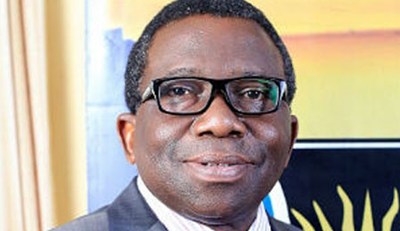The federal government has warned that the current outbreak of Lassa fever could kill 1,000 Nigerians, adding that it has spread to 17 states in the country, with Edo, Rivers, Nasarawa and Taraba States identified as hotspots of the virus.
The three states identified as hotspots joined Bauchi, Kano and Niger States, which have recorded a high incidence of the disease.
The Minister of Health, Prof. Isaac Adewole, stated this at the emergency National Council on Health (NCH) meeting with Commissioners for Health from all the states of the federation and other stakeholders in the health sector in Abuja tuesday.
According to the minister, the current outbreak of the virus is a national embarrassment, given that ignorance has been fuelling its spread.
He charged all health practitioners operating in all the states not to hide anything from their political leaders, adding that they should tell them the true situation of things.
The objective of the meeting, according to the minister, was aimed at facilitating discussions on the control of the Lassa fever outbreak, and developing strategies for prevention and management of all cases in Nigeria, among others.
Adewole told the gathering that so far the Lassa fever virus had spread to 64 local governments areas in 17 states, with the country recording 212 suspected cases.
“There is a high level of denial and a conspiracy of silence in some of our states. I think people take delight in saying we have no case and to me that is not the issue.
“In fact, if you are able to pick suspicious cases, to me that is the issue because that goes to tell us that the surveillance system is at work.
“We also want to alert all health professionals in the country that they should report any case. I have described the outbreak as a national embarrassment.
“We can manage the embarrassment, but when we allowed another outbreak to occur in August last year, it became a national shame to all of us.
“One of the things we will do to prevent us from dragging this nation into shame is to stamp out Lassa fever,” he said.
Providing data on the outbreak of the disease, the minister added: “Seventeen states have been affected across the country. It has affected 64 local governments across the country and we have been able to pick 212 suspected cases.
“It dates back to August last year, not just this year. It is better to over-count suspected cases than to undercount.
“The real hotspots are Niger, Bauchi, Taraba, Kano, Edo, Nasarawa, Plateau and Rivers, but for us to be honest with ourselves, all states should consider themselves at risk and please adopt measures to contain, prevent and reassure the community that they are on top of the disease.”
‪The minister further warned that the consequences of not doing enough to contain the spread of the virus might result in a wider spread of Lassa fever around the country.
‪Adewole ominously cautioned that Nigeria might witness about 3,000 cases and 1,000 deaths if nothing was done to curb the current spread of the virus.
‪The minister also cautioned against the traditional habit of drying grains and other food items on road pavements, adding that food items might become contaminated by rats, transmitters of the disease.
“We need to change our habits, even now people still dry their food by the road side, rats can infect such food and the virus gets spread,” Adewole warned.
He called on all the states to strengthen their surveillance systems, report all cases and collaborate with the Federal Ministry of Health to achieve success in the implementation of the Multi-Sectoral Response Strategy.
The National Coordinator and Chief Executive Officer of the National Centre for Disease Control (NCDC), Prof. Abdulrahman Nasidi, in his presentation, said: “Majority of the deaths recorded in Nigeria so far have been among the youths in their prime, most especially health personnel and pregnant women.”
Nasidi further stated that health promotional material review, adaptation and dissemination would be used to solve the current inadequate health promotion tools at all levels.
In his presentation, the Kano State Commissioner for Health, Dr. Kabiru Getso, said the state had recorded some confirmed cases and two deaths.
Getso told the gathering that Kano State had put in place effective measures to checkmate further spread of the virus across the state. He said public awareness campaigns had been taken to bus parks and other public places to ensure that Lassa fever is wiped out in the state.
The Commissioner for Health, Cross River State, Dr. Inyang Asibong, explained that the state had remained vigilant against the spread of the disease, with concentration on public awareness and strengthening capacity among health care officials.
Dr. Idris Omede of Kogi State also made a presentation on efforts by the state government to address any Lassa fever emergency in the state.
Also in a communiqué, the NCH said it had received a presentation on the epidemiological situation of the current Lassa fever outbreak in Nigeria including available response infrastructure/resource requirements by Prof. Nasidi; updates from Lassa fever affected states which detailed the progression of the outbreak(s) in their states; and current efforts to contain and prevent further spread of the disease and reassure from the affected communities.
It also received updates from chief medical directors/medical directors (CMDs/MDs) of federal tertiary health institutions located within the affected states on their responses and high index of suspicion towards all cases coming to their institutions, their management of confirmed cases, measures being implemented to prevent nosocomial spread within their facilities, and their community outreach efforts.
The council noted the efforts of the Ministry of Health, its agencies and parastatals, as well as the efforts of all states including non-affected states which are actively strengthening their surveillance systems, awareness and health programme campaigns. It also appreciated the Nigerian military and para-military medical corps for their commitment to support ongoing control efforts.
The council also inaugurated the Multi-sectoral Lassa Fever Eradication Committee for the implementation of the multi-sectoral response strategy, with Prof. Oyewale Tomori as chairman.
Other members include Prof. A Nasisdi, Prof. George Akpede, Prof. Sunday Omilabu, Prof. C. Ejembi, Prof. Z. Ilyasu, Dr. Pelumi Adebiyi, Prof. Chike Onwasigwe, Prof. Idris Mohammed, and officials from the Ministry of Health.
A total of 418 delegates participated from the departments and agencies of the Ministry of Health including CMDs/MDs of federal tertiary health institutions, state Ministries of Health and the Health & Human Services Secretariat of the Federal Capital Territory Administration (FCTA), Abuja, among others.
Source:Thisday




